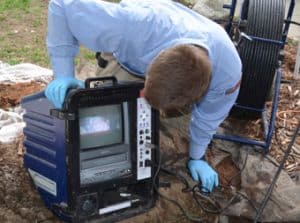A slab leak is one of the most serious plumbing problems you can have. They can be difficult to detect, difficult to repair, and cause a lot of damage. The longer it is allowed to proliferate the more damage it can cause. Aside from the initial leak itself, a slab leak can cause damage to flooring and drywall. The best line of defense when it comes to slab leaks is early detection. Here are some you might have a slab leak.
What Is a Slab Leak
Let’s start with what a slab leak is. A slab leak occurs when a pipe that is laid beneath a concrete foundation springs a leak. This can happen

for a variety of reasons:
- Gradual settlement of the home
- Earthquake
- A defect in the pipe – faulty wrapping of the pipe
- Improper installation – the pipe was damaged during construction
- Electrolysis – an occurrence when the copper in your pipes interacts with the minerals in the ground, this can form an electrical reaction that can wear on your pipes after a while
- When a leak occurs beneath the concrete slab of your home, the concrete will start to absorb the water. The water has no place to go but up. Eventually the water will rise and soak through your flooring and drywall.
Signs You Might Have a Slab Leak

A slab leak can occur gradually over time or after an event, such as an earthquake. Early detection is crucial for controlling costs of repair, and preventing further damage. Some signs to be on the lookout for include:
- Unexplained puddles on the floor
- Soaked through drywall
- Sound of rushing water when water is turned off
- Mold
- A Musky Smell
- A sewage smell
- Unexplained soggy patches of ground in your yard
- Lack of water pressure
- Unusually high water bill with no explanation
If you suspect a slab leak you should call your plumber right away. A professional plumber will be able to further diagnose the situation. Often times a non-invasive approach can be used to detect and make repairs. Contact Lesco Plumbing, Heating, and Cooling today to learn more.
Related Articles
Three of The Most Common Plumbing Problems and How to Avoid Them
Three Reasons Only an HVAC Professional Should Inspect Your Heating System







